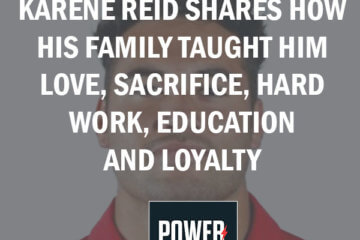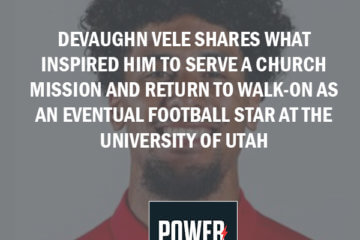Listen to the podcast here:
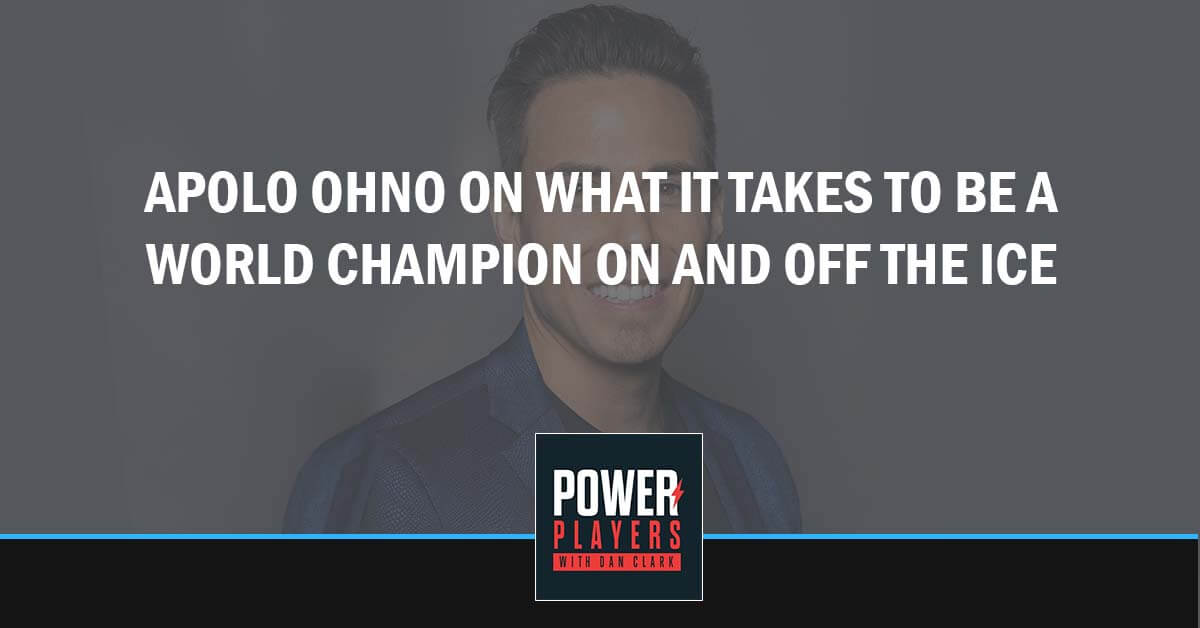
On the ice and off, Apolo Ohno has done it all. Multiple Olympic Medalist, best-selling author, entrepreneur, and sought-after speaker, he has driven his way to success. This is his story that he shares with host Dan Clark. Apolo shares his life and climb to the top of his sport – giving us an inside glimpse of what it takes to be a world champion on and off the ice! Tune in and be inspired by Apolo’s rise to the top, and know that you can do it too.
—
Apolo Ohno On What It Takes To Be A World Champion On And Off The Ice
This is an interview with Olympic speed skater and gold medalist, Apolo Ohno. Welcome to the show. Thanks for spending some time with me. In this episode, Apolo Ohno, who is an eight-time Olympic medalist with 2 gold, 2 silvers and 4 bronze medals, shares his life and climb to the top of his sport, giving us an inside glimpse of what it takes to be a world champion on and off the ice.
—
Welcome to the show, Apolo Anton Ohno. How are you?
Thank you. That was the best introduction I’ve heard of myself in a long time. I appreciate that. It’s very nicely done. Thanks for having me.
You’re an icon. Let’s get right to the questions that everybody wants to hear your answers to. You’re a natural-born athlete. You’ve succeeded at every level as an athlete, but I want to know how did you first identify your passion and extraordinary skill as a speed skater?
I grew up in the Seattle area in the Pacific Northwest. I came from a single-parent household. My father came from Japan at an age where he didn’t speak the language, have friends and have money. He started his life like the atypical immigrant story of coming to the US in search of something bigger for himself. When my father decided to take custody of me, he noticed that I had this tremendous amount of energy, both towards sport, but I was that kid who had difficulty sitting still in class. Being a single-parent household, my father had placed me into all of these different afterschool activities. I was excelling in all of them.
The one sport that jumped out of me was when I was twelve. My father and I watched the Winter Olympic Games at home. I fell in love with the sport. It was something that I’d never seen before. I saw these athletes wearing these superhero-like outfits without the cape and speeding around this ice rink at these impossible angles, going 35 to 40 miles an hour and it didn’t even look real. That was the first time I had my first glimpse of what speed skating was.
It wasn’t your traditional speed skating, the one that you had heard and seen about Bonnie Blair, Dan Jansen and Eric Heiden, where they skate on the large 400-meter oval. This one looked different, more chaotic, fast aggressive, and I want to try something about it. My passion didn’t come from the sport until much later. I excelled very early in the sport before I even knew that I had the potential to make an Olympic team or loved what I was doing.
I found that passion multiple times throughout my career as I revisited this introspective conversation about how I get better? Is this the right path? I can’t guarantee a win, but how can I guarantee fulfillment and happiness in this direction of sports that I’m pursuing? When we talk about passion in the realm of the Olympic space, every athlete has it. You have to have it, but it goes a little bit beyond. When you wake up every single day for 10, 15 years of your life, you go in circles. That’s your profession.
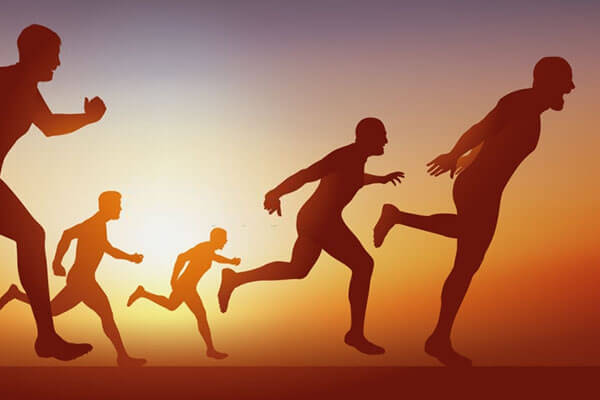
Apolo Ohno: When you look at the Olympic space, you’re talking about an athlete who trains for years for their shot at a 40-second race in which they need to be absolutely perfect. When you start thinking about those types of micro details, everything seems to matter.
You have to try something else that you can find that you can lean on when sometimes the passion feels like it’s maybe waning or it’s not there. Luckily for me, I was able to maintain that consistency, but it was never easy. I’m incredibly grateful for the opportunity to pursue something that I loved in the beginning as a child.
Correct me if I’m wrong, but what I’m understanding, Apolo, is that your passion wasn’t necessarily for skating. Your passion was for the exhilaration of living on the edge, pushing yourself to the limit of waking up early every day with the attitude that the only person you need to be better than is the person you were yesterday.
Most of us will never be Olympic speed skaters, so teach us how to identify our passion, maybe even more importantly, reflect on your dad’s influence on you because a lot of parents tap into my show. I’m a father of four. We need to figure out how to trigger this passion in our children and help them find this passion. You blew my mind. You said speed skating was only a vehicle for you to become the best version of yourself. Weigh in on that, will you please?
When we talk about trying to find your passion, if you went across the United States and asked everyone if they are in the passion, realm, arena or career path passionate, I don’t think that you’d get a clear answer from everyone. Across the board, people will say, “I’ve got to take care of my family. This is what I know and am good at. Therefore, I’m in this job.” Luckily, I loved speed skating. I loved the sport and I was passionate about it. It goes beyond that when you drill it down to a deeper level. It wasn’t just about the sport because the same attributes, the same skillsets that are transferable from the Olympic space, those life skills, the perseverance, resilience, discipline, sacrifice, focus, mindset, which is the game within the game, that was the most value out of all of these things.
When I was growing up, that’s what my father was trying to always instill within me. Regardless of the vehicle and the path we are pursuing, the attributes that we have at our fingertips, the skillset and God-given talents that we have between our ears is sometimes a place where we don’t look. That’s where the real strength and value lies. It may be easy for me to say this. I have metals. Not all of them are gold. I have had tremendous career wins in my life, but I’ve also had tremendous career losses, failures and stumbles in my life.
Passion happens to be important. I don’t believe it’s necessary, however, as we progress. Many of us don’t have the luxury of pursuing our passions or as parents, people are always trying to help their children find their passions, which they’re good at. It may not be an actual task that they’re doing, but it may be an attribute associated with that task, whether it’s a learning process, growth or this introspection of, “How I am going to face my challenges?” Life will knock you on your behind. That is going to happen.
That’s why my passion for sports as a whole is very powerful. I don’t have kids yet. I hope that I do, but when we do decide to have children, my goal is to have them be active and play. I don’t care if they become Olympic athletes or world-class. I care about how they play the game and learn about lessons that can accelerate their life. That’s my two cents. A lot of this stems from the progress and relationship I’ve had with winning and losing in sport, business and life. I continuously keep getting myself back up regardless of how hard I get hit.
That’s perfect because that ties into the second P of Preparation. Here’s my point. I played football forever and baseball at a pretty high level. When you get old like me, you still get the boys together and go into a gym on a Saturday morning at a nice place. You have a pickup basketball game. In the offseason, a lot of professional athletes, football, basketball and baseball players show up and we get a pickup game.
Preparation can be in everything that we do. The smallest of details in the smallest of things done consistently over time can compound into the greatest returns.
Those of us who think that we can succeed and perform at a high level are Saturday warriors. When you come down to the game and it matters if you’re going to win or lose, there’s a clear difference between the mindset and preparation of a Saturday you want to be and someone that performed at your level for so many years consistently. In the second P, Preparation, you already brought up mindset. Let’s talk about how you think and prepare differently than most so that when you did crash and burn, you knew that you could get back up and go again.
I’m not sure how others would prepare in their own space. I was able to find what worked best for me, which was beneficial along this path. Very early, I was introduced to this power of visualization, belief and rerunning these scenarios over and over again in my head until they felt so real that when I did win, I felt like I had already done it. That’s one element. I also believe that preparation can be in everything that we do.
It can be the smallest of details. Things that are done consistently over time can compound into the greatest returns. When you look at the Olympic space, you’re talking about an athlete who trains 4, 8, sometimes 12 or more years for their shot at a 42nd race in which they need to be perfect. Everything seems to matter when you start thinking about those types of micro details. That’s why it’s difficult to get athletes on the phone 1 or 2 months before the games for an interview. They want to be so immersed and contained within their routine and control the elements they can control.
In a sport like short-track speed skating, where a lot of variables are constantly being thrown at you, there’s no guarantee of victory. Regardless of how hard you practice, train and show up, you have to be able to look at the sport and say, “How can I leave no stones unturned in that preparation?” If that’s my only guarantee in life and I walk away, regardless of the outcome, I can tell my family, friends and myself, “I put it all out there on the line. I was able to risk it. It did or didn’t happen for me.” That’s okay.
For those who said, “If I had only trained a little bit harder, focused on recovery, knock on out on the weekends or whatever those things are, those would, could, should have, we all have those because we’re human beings. We’re not perfect and robotic.” My goal was to create a new methodology of mindset. I wanted to create that cyborg mentality and these machine-like mechanisms where I was robotic in terms of the things that I ate every day, the times I woke up, and the mental and physical preparation. I had no cracks in my armor because I knew that there was no guarantee that I was going to win by the time I got to the games.
The only thing that I could talk about was when I looked in the mirror as if I could answer the question, “Are you happy with how you prepared? Is this enough?” It’s a difficult radical question to ask yourself. I can go much more into detail for me, but a significant transformation had to occur from the first time I competed in Salt Lake City in 2002 to when I finished my career in 2010.
There were several transformations, a reinvention that I had to go through both in terms of my psychology in terms of the team, coaches, management and leadership. All of those elements come into play and we have to evolve continuously. I’ve been so believing in the fact that if you believe that you cannot change, you will be stagnant. We, as human beings, crave to inch forward. We crave progress, even if it’s a minute. That only comes with self-discipline.
This brings us to the third P, Pursuing your passion. Back to my analysis of what you were teaching the world about passion, figure skating and speed skating is for someone else like Eric Heidens, Bonnie Blairs, Dan Jansens of the world. You crave a different high but as we established with the first P on Passion, the more you talk or follow your passion is the pursuit of excellence in everything you do. The last P brings us to dancing with the stars. It goes to your perfect wavy brown hair and iconic little sliver beard that drops from your lower lip that causes a craze across the world.

Apolo Ohno: When you truly want something, you can achieve far beyond what your wildest dreams are.
It goes to you finishing the Ironman and winning it everything you do. The question is, how do you remain motivated to keep pursuing every single thing you do? It will lead to my conclusive question based on Professor Randy Pausch’s famous last lecture. You teach us what keeps you fired up and why you are always at the highest level. If you had one day to live, what is your one consolidated message to the world? I’ll let you teach us.
That last one is very powerful. When I look back on all these things we had identified and talked about, first and foremost, finding these realms of performance and ways to perform well at the highest level, I didn’t win at everything I did. I was able to win sometimes. Those sometimes happen to matter on the Olympic stage, but I would be lying if I said that those failures are what made me hungrier. Those times where I didn’t perform and prepare well when my mind slipped and I wasn’t as concentrated and focused motivated me.
I had many friends asking me many times, “Apolo, you’ve won this. Why are you doing an Ironman? Why are you doing this in business? Why are you pursuing this?” My answer has always been, “I want to grow. I’m hungry to grow and learn. I want to share these experiences with people all over the planet.” It is believed that sport happened to be the catalyst for me to achieve something that I didn’t think was possible. I was often not the strongest, fastest or most technically gifted, but I found a way. I hope that serves as a reminder to everyone who maybe doesn’t feel like they have what it takes in terms of the genetic ability of someone else. I don’t believe in that.
I believe that when you truly want something, you can achieve far beyond what your wildest are. I know it because I’ve lived it. I felt it. I’m far from perfect. If someone like me, who grew up in a Pacific Northwest, a single-parent household, didn’t have much, I had passion, drive, hunger, discipline and obsession. That was a huge part of this process. I want human beings, especially in this country, to recognize the power in their hands and that they don’t have to go through life in the passenger seat.
In reality, you are in the driver’s seat. You may not be driving exactly to your destination and everything may not be under your control, but the one thing that is within our control is our perception of those challenges, our perception and how we react to those issues and challenges and turn them into opportunities of triumph versus trial. How do we do that? That takes practice like anything else. The brain can react like a muscle. The more and more that you consistently do that and react the same way, you’ll be tougher, stronger, faster, better, smarter, all those things that we strive to be.
I’m hungry to grow because I feel two things. My life was so one-sided in sport for so long, so I was completely obsessed with identifying and finding new parts of my personality interests in the world. That’s the first part. The second part was I want to share these experiences with people because when I hear from others, get inspired by other people across our nation and hear about their trials and tribulations, it tells me that we still have so much further to go. There’s so much opportunity out there, regardless of chaos, uncertainty, our solidarity, unification and ability to care for one another and ourselves. Everyone knows when we say, “That’s a woman or a man on fire. It’s like a dog on a bone. You can’t get them to think about or contract anything else,” that can be turned into something so powerful and positive. It’s a light switch.
It’s my mission to help people find that within themselves, find that they can turn their high-performance mechanism on like a light switch and watch how their life can drastically move in the direction that they’ve always wanted. It’s not until that happens. No matter how many times I talk to them, and someone like Tony Robbins or another personal development person says, “This is what you can do,” it’s got to come from within.
We are always outwardly seeking catalysts for change and progress, whether it’s sports or you talk about the Weekend Warriors. Oftentimes, they’re doing that because they’re trying to improve. It’s so much more than just the sport itself. There’s something deeper there. I’m trying my absolute best to get people to recognize that they hold that light switch in their hand, waiting for them to turn it on. It is powerful when it goes on and gets out of the way.
We, as human beings, crave to inch forward. We crave progress, even if it’s minute, and that only comes with self-discipline.
Your last question, of I’ve got one day to live, that’s challenging. We are at these very unprecedented times in history. When we are in these situations where people sometimes feel helpless, confused and uncertain, it takes a lot of strength and ability to keep calm and take a step back out of our shoes. We call it stepping out onto the balcony. When you’re on the field of battle, you can’t see everything that’s going on.
You could feel it and emotionally know the intensity that’s there, but you may be fighting something that’s not worth it that’s in the wrong direction. Until you step out, go on the balcony and you can see the entire landscape and recognize, “This fight that I’m thinking about or seeing in front of my own eyes is 1 chapter in 100-chapter book.”
“If I can recognize that and see that on the other side of this happens to be tremendous growth, lifelong learning and lessons that I can implement both into my career, personality into my children, family and friends, it’s a different perspective.” That also comes from a place of gratitude. It’s tough. One day on earth, what would I do? I would spend a lot of time telling every person what I think about them and how beautiful and powerful they can be.
I hope to create a drop in the water that will ripple across this planet in a way that we live better. We’re better to each other. We try to do the right things and understand through empathy and gratitude that none of us are perfect. I may not see the world that you see it because we’re all wearing different contact lenses. We all have different lenses on. We’re all unique beings. The one thing that we can have is that nothing stands in our way when we have collective unification and strength. I truly believe that. That’s what I would hopefully leave.
I honor you, Apolo Anton Ohno. I kept interrupting you two different times because you got me so fired up. I want you to tell the world how to get a hold of you. You’re a speaker. Tell us how to connect with you and join your tribe.
You find me on all the social channels, my Twitter, Instagram @ApoloOhno, LinkedIn and website, www.ApoloOhno.com.
I honor you. This has been one of the great interviews of my career. As I always sign off, remember when you finally decide to be a power player, your power play begins in you like Apolo reminded us. Until next time. Quantify your takeaway and go make a power play. Have a great day.
Important Links:
- Apolo Ohno
- Twitter – Apolo Ohno
- @ApoloOhno – Instagram
- LinkedIn – Apolo Ohno
- https://www.Facebook.com/ApoloOhnoOfficial/
About Apolo Ohno
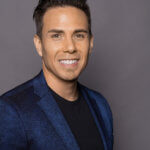
America’s most decorated Winter Olympian of all time, Author, Speaker on a life mission to help you become your best in health, work, and life.
